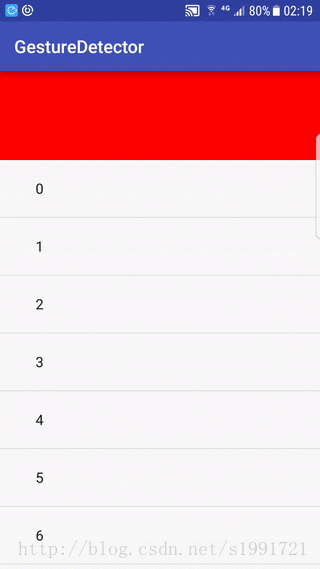жӮЁеҘҪпјҢзҷ»еҪ•еҗҺжүҚиғҪдёӢи®ўеҚ•е“ҰпјҒ
иҝҷзҜҮж–Үз« дё»иҰҒд»Ӣз»ҚAndroidеҰӮдҪ•ж №жҚ®жүӢеҠҝе®һзҺ°йЎ¶йғЁViewиҮӘеҠЁеұ•зӨәдёҺйҡҗи—Ҹж•ҲжһңпјҢж–Үдёӯд»Ӣз»Қзҡ„йқһеёёиҜҰз»ҶпјҢе…·жңүдёҖе®ҡзҡ„еҸӮиҖғд»·еҖјпјҢж„ҹе…ҙи¶Јзҡ„е°Ҹдјҷдјҙ们дёҖе®ҡиҰҒзңӢе®ҢпјҒ
йҰ–е…ҲжқҘзңӢдёҖдёӢж•Ҳжһңпјҡ

еӨ§дҪ“жҖқи·ҜеҰӮдёӢпјҡ
жҖ»дҪ“еёғеұҖз”ЁдәҶдёҖдёӘиҮӘе®ҡд№үзҡ„ViewGroupпјҢйҮҢйқўеҢ…дәҶдёӨдёӘViewпјҲtop ViewпјҢbottomViewпјү
жҲ‘еңЁbottomViewйҮҢж”ҫдәҶViewPagerпјҢйҮҢйқўеҸҲжңүFragmentпјҢFragmentйҮҢж”ҫзҡ„жҳҜListView
еҺҹзҗҶпјҡ
ViewGroupеңЁеҲҶеҸ‘touchEventзҡ„ж—¶еҖҷе…ҲйҖҡиҝҮжүӢеҠҝGestureDetectorеҲӨж–ӯжүӢеҠҝж–№еҗ‘пјҢеҪ“еҗ‘дёҠж»‘еҠЁзҡ„ж—¶еҖҷи®©topViewе’ҢbottomViewеҗҢж—¶еҗ‘дёҠ移еҠЁпјҢеҸҚд№ӢдәҰ然гҖӮ
ж•ҙдҪ“жҖқи·ҜдёҚжҳҜеҫҲйҡҫеҰӮдёӢжҳҜе№Іиҙ§пјҡ
еёғеұҖж–Ү件
<com.lin.gesturedetector.MyViewGroup android:id="@+id/view_group" android:layout_width="match_parent" android:layout_height="match_parent"> <include android:id="@+id/group_top" layout="@layout/view_top" /> <include android:id="@+id/group_bottom" layout="@layout/view_bottom" /> </com.lin.gesturedetector.MyViewGroup>
жүӢеҠҝзӣ‘еҗ¬йҮҚиҰҒзҡ„жҳҜжү“logзңӢдёҖдёӢдёҠдёӢж»‘еҠЁжҳҜж•°еҖјзҡ„еҸҳеҢ–пјҢжүҫеҲ°е…¶и§„еҫӢпјҡ
@Override
public boolean onScroll(MotionEvent e1, MotionEvent e2, float distanceX, float distanceY) {
Log.i(tag, "onScroll -> distanceY" + distanceY);
if (distanceY < 0) {// жүӢеҠҝеҗ‘дёӢж»‘еҠЁжҳҜиҙҹеҖј
animatorLayoutOffset(1);
}
if (distanceY > 0) {
animatorLayoutOffset(0f);
}
return true;
}дёҖе®ҡи®°еҫ—еңЁViewGroupеҶ…жҹҘжүҫжҺ§д»¶йңҖиҰҒеңЁonFinishInflateеҗҺжүҚиғҪжүҫеҲ°пјҡ
@Override
protected void onFinishInflate() {
super.onFinishInflate();
viewTop = findViewById(R.id.group_top);
viewBottom = findViewById(R.id.group_bottom);
}еңЁViewGroupеёғеұҖзҡ„йҖ»иҫ‘дёӯйңҖиҰҒеӨ„зҗҶзҡ„жңүдёҖдёӢеҮ зӮ№пјҡ
1гҖҒonMeasureзҡ„ж—¶еҖҷиҰҒжҠҠеӯҗжҺ§д»¶жөӢйҮҸеҮәжқҘ
2гҖҒonLayoutж—¶йңҖиҰҒжүӢеҠЁе°ҶеӯҗжҺ§д»¶еёғеұҖ
жҺҘдёӢжқҘе°ұжҳҜзӣ‘еҗ¬жүӢеҠҝи®ҫзҪ®еҠЁз”»пјҢдёҚеҒңзҡ„onLayoutд»ҘиҫҫеҲ°topViewе’ҢbottomViewзҡ„еёғеұҖж•Ҳжһң
@Override
protected void onMeasure(int widthMeasureSpec, int heightMeasureSpec) {
int width = MeasureSpec.getSize(widthMeasureSpec);
int height = MeasureSpec.getSize(heightMeasureSpec);
viewTop.measure(MeasureSpec.makeMeasureSpec(width, MeasureSpec.EXACTLY), MeasureSpec.makeMeasureSpec(height, MeasureSpec.AT_MOST));
viewBottom.measure(MeasureSpec.makeMeasureSpec(width, MeasureSpec.EXACTLY), MeasureSpec.makeMeasureSpec(height, MeasureSpec.EXACTLY));
setMeasuredDimension(width, height);
}
@Override
protected void onLayout(boolean changed, int l, int t, int r, int b) {
int topHeight = viewTop.getMeasuredHeight();
float offset = layoutOffset * topHeight;
int width = r - l;
float topViewYTop = offset - topHeight;
float topViewYBottom = topViewYTop + topHeight;
viewTop.layout(0, (int) topViewYTop, width, (int) topViewYBottom);
viewBottom.layout(0, (int) topViewYBottom, width, (int) topViewYBottom + viewBottom.getMeasuredHeight());
}
private void animatorLayoutOffset(float offset) {
if (animator != null && animator.isRunning()) {
return;
}
animator = ObjectAnimator.ofFloat(this, "layoutOffset", layoutOffset, offset);
animator.setDuration(500);
animator.start();
}д»ҘдёҠжҳҜвҖңAndroidеҰӮдҪ•ж №жҚ®жүӢеҠҝе®һзҺ°йЎ¶йғЁViewиҮӘеҠЁеұ•зӨәдёҺйҡҗи—Ҹж•ҲжһңвҖқиҝҷзҜҮж–Үз« зҡ„жүҖжңүеҶ…е®№пјҢж„ҹи°ўеҗ„дҪҚзҡ„йҳ…иҜ»пјҒеёҢжңӣеҲҶдә«зҡ„еҶ…е®№еҜ№еӨ§е®¶жңүеё®еҠ©пјҢжӣҙеӨҡзӣёе…ізҹҘиҜҶпјҢж¬ўиҝҺе…іжіЁдәҝйҖҹдә‘иЎҢдёҡиө„и®Ҝйў‘йҒ“пјҒ
е…ҚиҙЈеЈ°жҳҺпјҡжң¬з«ҷеҸ‘еёғзҡ„еҶ…е®№пјҲеӣҫзүҮгҖҒи§Ҷйў‘е’Ңж–Үеӯ—пјүд»ҘеҺҹеҲӣгҖҒиҪ¬иҪҪе’ҢеҲҶдә«дёәдё»пјҢж–Үз« и§ӮзӮ№дёҚд»ЈиЎЁжң¬зҪ‘з«ҷз«ӢеңәпјҢеҰӮжһңж¶үеҸҠдҫөжқғиҜ·иҒ”зі»з«ҷй•ҝйӮ®з®ұпјҡis@yisu.comиҝӣиЎҢдёҫжҠҘпјҢ并жҸҗдҫӣзӣёе…іиҜҒжҚ®пјҢдёҖз»ҸжҹҘе®һпјҢе°Ҷз«ӢеҲ»еҲ йҷӨж¶үе«ҢдҫөжқғеҶ…е®№гҖӮ
жӮЁеҘҪпјҢзҷ»еҪ•еҗҺжүҚиғҪдёӢи®ўеҚ•е“ҰпјҒ